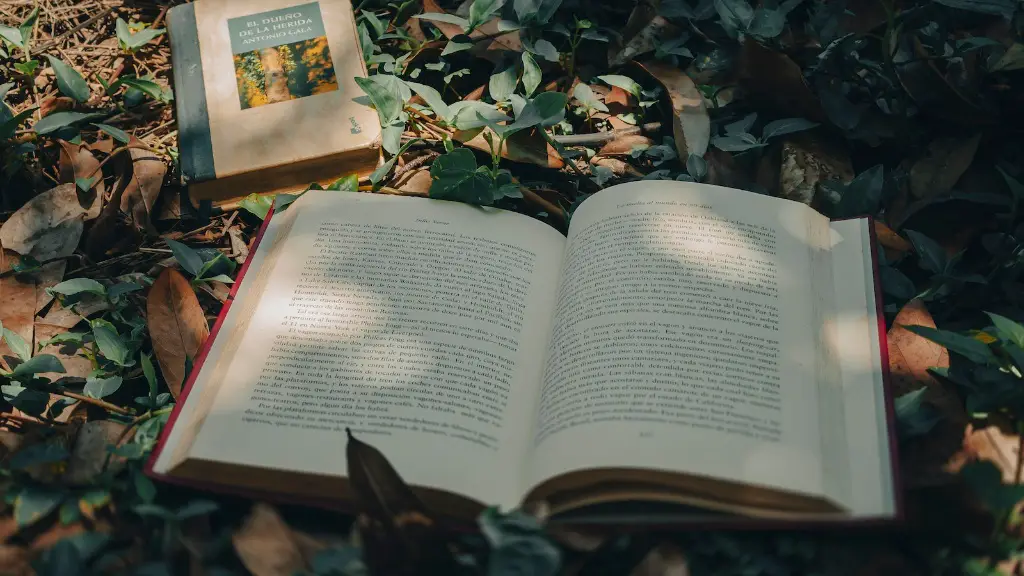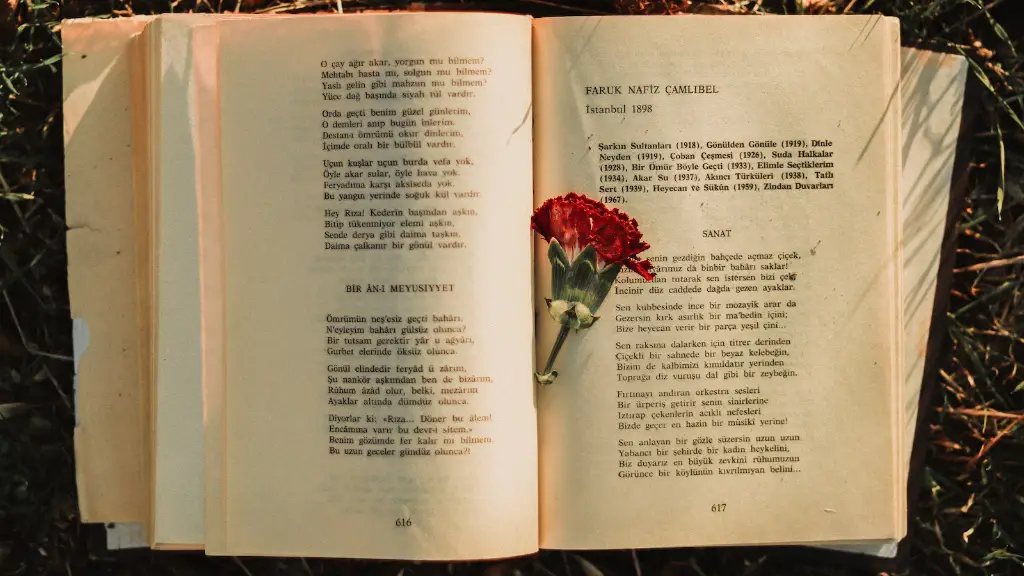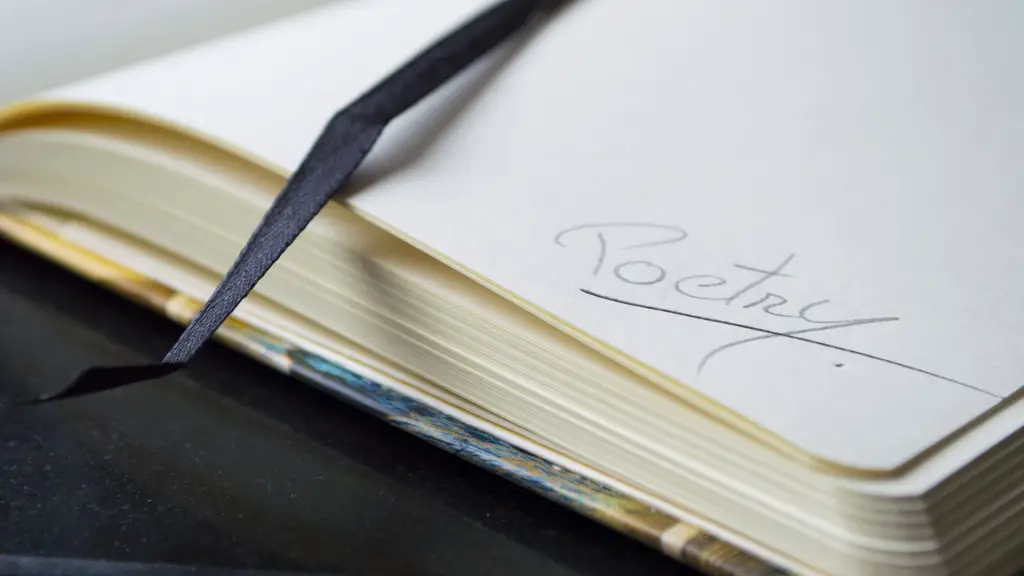Definition of Dialect in Poetry
Dialect in poetry is a type of language that is used to capture the flavor and flavorations of a particular region or locale. It is a distinct way of speaking and writing that has evolved over time. It is often an amalgamation of various other dialects and native languages and can include slang, grammar, and an extensive vocabulary that is specific to the particular region in which it is used. Dialect can be used to convey a particular attitude, style, or mood, and is a key element of the creative process of writing and performing poetry.
The Origins of Dialect in Poetry
The use of dialect in poetry dates back centuries, with examples found in the Song of Solomon in the Old Testament, as well as the Old English of Beowulf and the popular ballads of England. Throughout the history of poetry and literature, dialect has been an important element of how authors, performers and poets evoke a particular mood and evoke a certain emotion from their readers and listeners.
Dialect can be used to effectively recreate a particular era or place, with the words and phrases conveying the area’s regional culture, customs and thoughts. Poets, authors and performers can use dialect to create a sense of immediacy and relevance for the audience, immersing them in the poem’s speaker, narrator, protagonist and story.
Types of Dialect in Poetry
Dialect in poetry can take a number of forms, such as regional dialect, where words and phrases are used to evoke a sense of authenticity and cultural aspect. Another type of dialect is literary dialect which is used to emphasize a particular emotion or time period. This includes words and phrases that might be unfamiliar to the reader, but which can help to create an emotional response or invoke a particular atmosphere. Another type of dialect is typical or spoken dialect, which is used to emphasize the use of everyday vernacular or colloquialisms. It is used to recreate a regional speaker and can be used to create a conversation between the poet and the reader.
The Use Of Dialect In Poetry
Dialect in poetry can be used to create a certain atmosphere, to evoke emotion and to connect with the audience in a number of ways. It can be used to bring the poem to life, to convey certain ideas, concepts and scenes that the poet wishes to emphasize.
When using dialect in poetry, the poet must consider the intended audience, and decide whether the dialect should be written in such a way that the intended audience will understand, or if it should be more general or unfamiliar to the reader. This is essential in order to achieve the desired emotional response or impact.
It is also important to consider the syntax and grammar of the dialect when writing in it as well. Syntax can have a large impact on the way the poem is read and understood by the reader, so it should be chosen with care and precision.
Difficulties with Dialect in Poetry
Using dialect in poetry can have its own set of challenges, including ensuring that the dialect is natural and authentic to the place and time period that the poet is aiming to capture. It is important to ensure that the dialect does not alienate the intended audience and that it is easy to understand. Additionally, it can be difficult to ensure that the dialect flows naturally between sentences and carries the same emotion and atmosphere throughout the poem.
Using dialect in poetry can also create a difficult situation for the poet, if the dialect is not correctly written or if it is too difficult to understand. In this case, the poem’s impact is diminished, as the reader will be unable to connect with the ideas, concepts, and emotions that were intended by the poet.
The Benefits of Using Dialect in Poetry
Using dialect in poetry can have a range of benefits. It can be used to emphasize or evoke a particular emotion, to convey a story, or to create a sense of immediacy and relevance. Additionally, it can be used to connect with the audience, as the use of dialect can create a relationship between the poet and the reader.
Using dialect in poetry can also help to convey a particular atmosphere and mood, while also helping to bring the poem to life. This is because dialect can create the feeling of a conversation between the poet and the reader, making the poem more accessible and meaningful.
The Impact of Dialect in Poetry
The use of dialect in poetry can have a powerful impact on the reader. It can evoke a range of emotions, from nostalgia to sadness and joy, and can be used to create a strong emotional response. Additionally, dialect can be used to bring the poem to life and to create connections between the poet, the poem and the author.
Using dialect in poetry can thus be a powerful tool in the creative process and can often enhance the message that the poet is trying to convey. It can also be used to create a richer and more vivid experience for the reader, so it is an important element to consider when writing poetry.
The Uniqueness of Dialect in Poetry
Dialect in poetry is an important part of the creative process, as it can add depth, authenticity, and emotion to the poem. It can be used to enhance the poem’s narrative and can be used to evoke certain moods and atmospheres. Additionally, dialect in poetry allows for a conversation between the poet and the reader which can enrich the poem and can make it more meaningful.
What makes dialect in poetry unique is that it is an individualized way of speaking and writing, which contains unique words and phrases and an extensive vocabulary that is specific to the region. Additionally, it can evoke nostalgia, provide an authenticity to a particular area, and can create a powerful emotion in the reader.
The Use of Dialect in Different Genres
Dialect in poetry is not only used in traditional forms of poetry, but can also be found in a range of different genres. It can be used in prose to create a sense of immediacy, in fiction to evoke particular scenes, and in spoken word poetry to create conversation and connection between the poet and the audience.
Using dialect can help to create a powerful connection between the reader and the writer, and can also be used to evoke emotion, nostalgia and atmosphere. As such, it is an important tool to consider when writing poetry and can be used to create a multi-dimensional experience for the reader.
The Effect of Dialect on The Memorable Quality Of A Poem
The use of dialect in poetry can help to create a powerful and memorable experience for the reader. It can be used to create vivid impressions, to evoke emotion and to create a relationship between the poet and the reader. This can help to create a lasting impression and can be used to help bolster the poem’s overall impact.
Additionally, dialect can help to set the poem apart from other similar poems or pieces. This can be especially important when it comes to competitions or contests as it can create a unique and memorable experience for the reader.
The Importance Of Studying Dialect In Poetry
For those looking to write poetry that employs the use of dialect, studying the language and the region can be an invaluable tool. Studying the language and the nuances of dialect can help the poet to effectively craft their poem and ensure that it captures the culture, idea and emotion that they are trying to convey. Additionally, studying the region and its particular customs and phraseology can help the poet to create a memorable and powerful piece of poetry, as well as create a lasting impression on the reader.
The Impact of Dialect On Performance and Interpretation
The use of dialect in poetry can also have an impact on performance and interpretation. Making sure that the dialect is correctly interpreted, and that it is clear and easily understandable is essential. Additionally, understanding the syntax, grammar and context of the dialect can help to ensure that the poem is accurately interpreted and that the poet’s intentions are understood completely.
Performing or delivering a poem that effectively and accurately employs the use of dialect can create a powerful experience for the listener and can help to bring the poem to life. As such, it is essential to make sure that the performance is accurate and that the poem remains true to the poet’s original intentions.



